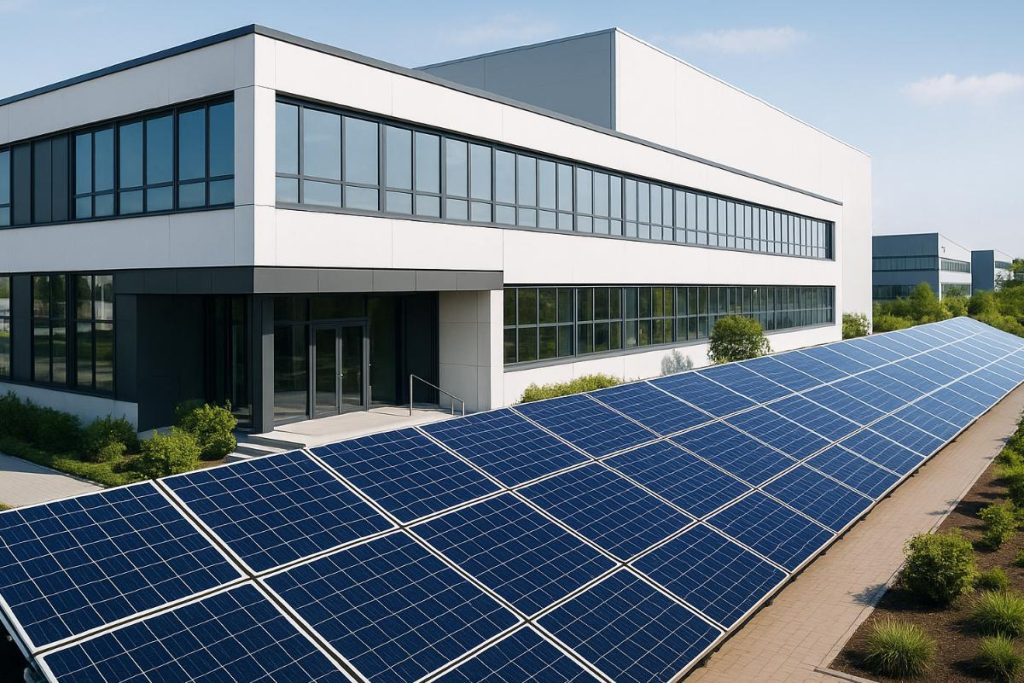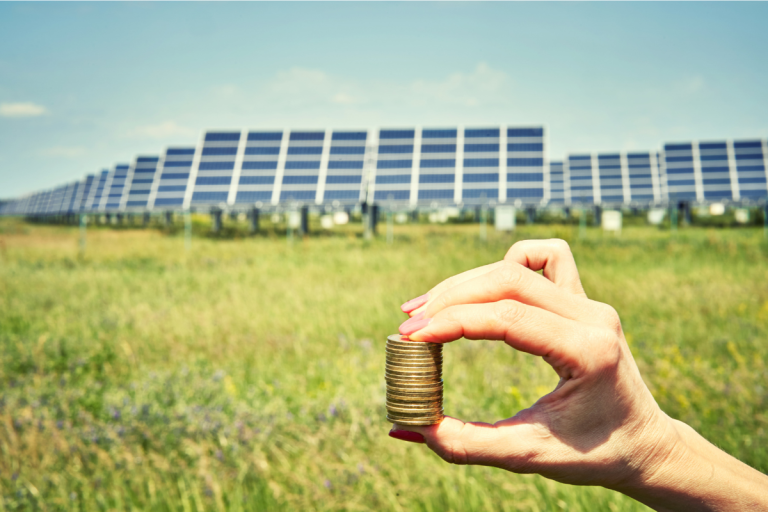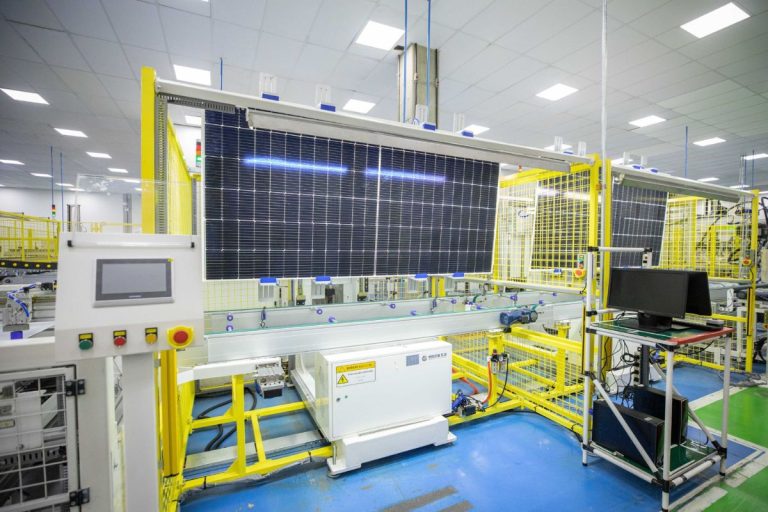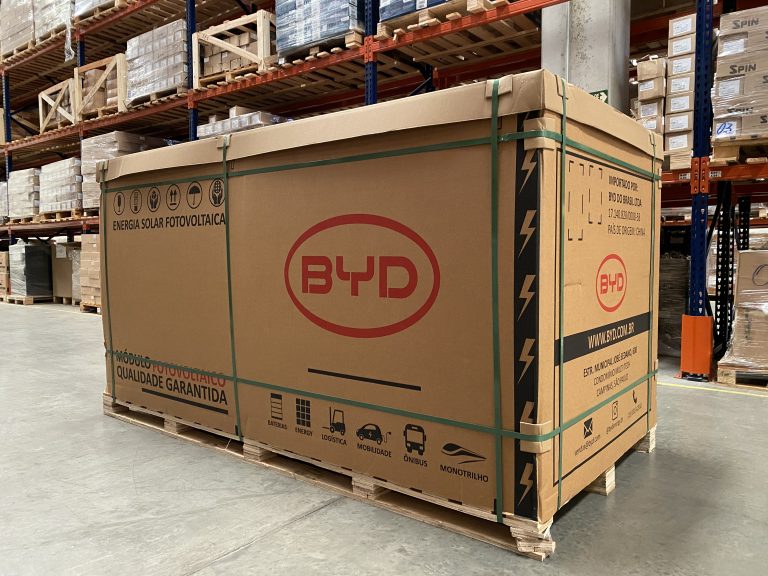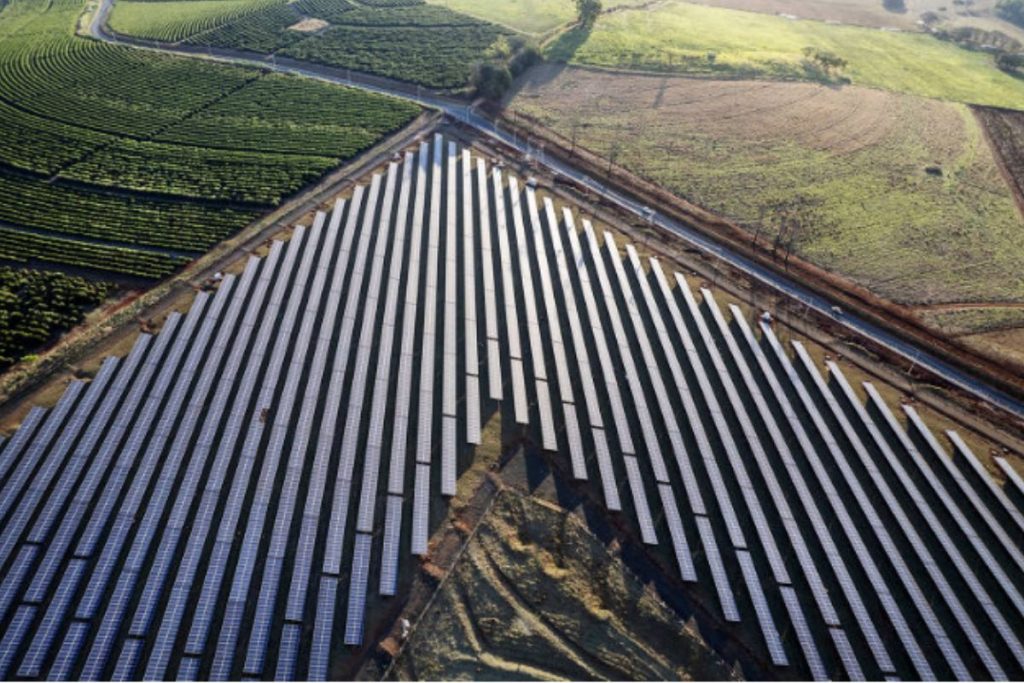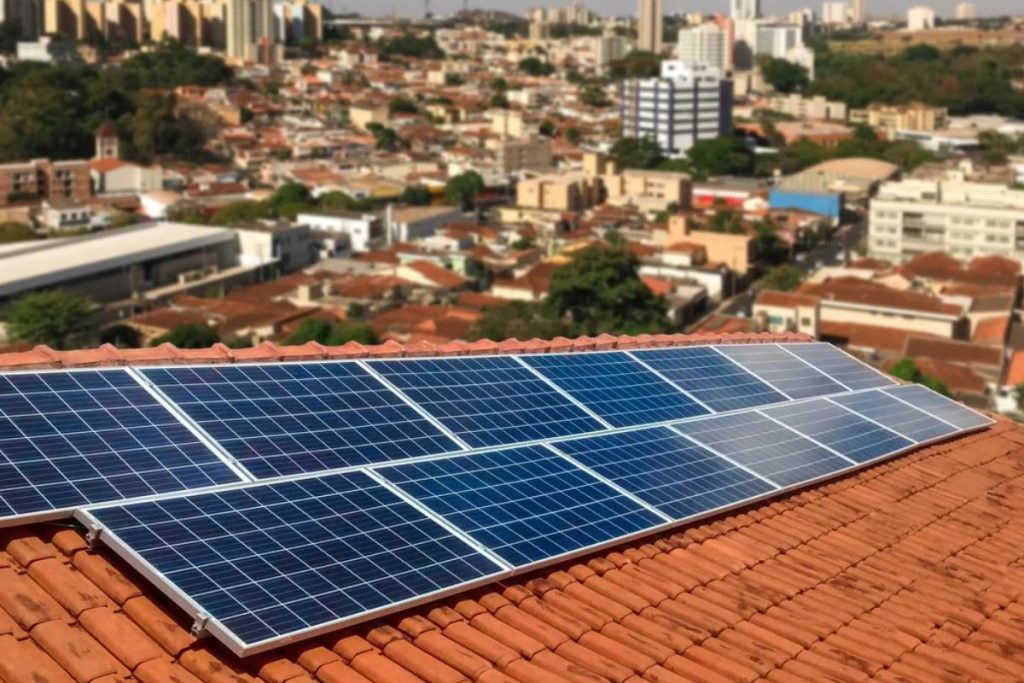Companies of all sizes are looking for ways to reduce operating costs and improve the sustainability of its business, the solar energy for companies has emerged as an intelligent solution that combines economy and environmental responsibility.
By harnessing sunlight to generate electricity, your company can save up to 95% on the electricity billto protect themselves from tariff increases and returning the investment in a few years. In addition to the positive financial impact, investing in solar energy strengthens brand image as environmentally responsible, something increasingly valued by customers and partners.
In this complete guide, you will understand the how business solar energy worksyou will learn about the main benefits and incentives, you will see how to implement a photovoltaic system in practice and will answer the main questions on the subject.
Get ready to find out why solar energy can be one of the best strategic decisions for your business. how to take the first steps towards cheaper, cleaner and more reliable energy.
What is solar energy for companies and how does it work?
Solar energy for companies consists of install photovoltaic solar panels at the company's headquarters or facilities to produce electricity from the sun. In essence, the system works in a similar way to the residential one: the photovoltaic modules capture sunlight and convert it into direct electric current. Then a solar inverter transforms this direct current into alternating current, which is the form of energy used by the company's electrical equipment.
All the energy generated can be immediately used in operationsIt is also used to power machines, computers, lighting and other day-to-day consumption. If the company produce more energy than it consumesThe surplus is injected into the electricity grid of the local distributor, generating energy credits. These credits can be used at a later date to reduce consumption during the night or on rainy days, or even to offset the expenses of other units in the same company (thanks to the shared distributed generationIn addition, you can use credits at branches under the same ownership within the concessionaire's coverage area).
In short, going solar allows a company to produce its own energy. own clean energyreducing dependence on the conventional electricity grid. The big difference with residential systems is in the system scale: companies generally have a higher electricity consumption, requiring more solar panels and sized equipment to meet demand. But the principle of operation and the main components (panels, inverters, cables, fixing structures, etc.) are the same. In the following topics, we'll look at types of business solar systems available and why this technology has become such an attractive investment in the business world.
Types of solar energy systems for companies
Just like in homes, companies can choose different types of photovoltaic systems according to their needs and context. The three main models are: on-grid, off-grid and hybrid. Each one has specific characteristics:
On-grid system
This is the most common type in urban companies. It works in parallel with the public electricity grid. During the day, the company first consumes the energy generated by the solar panels; if there's a surplus, it goes into the grid and becomes electricity. credit.
At night or during times of low generation (cloudy days), the company automatically uses energy from the electricity grid. This combination guarantees continuous supply. The great advantage of on-grid is energy compensationThe surplus solar energy becomes credits that reduce the electricity bill (in the Brazilian system of net meteringThe credits are valid for 60 months). Even companies with subsidiaries can take advantage of modalities such as remote self-consumption or shared generationusing credits in other units.
As such, the on-grid system brings maximum savings on electricity bills and maintains the connection to the grid to meet any needs.
Off-Grid system (autonomous)
Suitable for companies in remote locations or those suffering from an unstable electricity supply. Off-grid, no connection to the public network; all the energy consumed comes from the solar system + storage batteries.
During the day, the panels supply the operation and charge batteries with any surplus. At night or on rainy days, the batteries supply the electricity. This system provides total network independence and continuity even in the event of blackouts. Companies in isolated rural areas, for example, can operate with reliable energy using off-grid. The downside is that it requires investment in large batteries and good sizing to ensure sufficient autonomy.
Even so, for specific needs (or even for those who want to avoid losses due to power outages), off-grid is a good option. tailor-made solutionThe cost of batteries has been falling in recent years thanks to technological advances.
Hybrid system
It combines the two above, i.e. it is connected to the grid and has batteries. In practice, a hybrid system allows store energy and also use the electricity grid, bringing the best of both worlds.
The company can, for example, store solar energy in batteries during the day and use it at peak times (when the utility's tariff is more expensive) or in the event of a grid failure, guaranteeing energy security. In countries where regulation allows, hybrid systems already protect operations against blackouts and avoid paying the higher tariffs at peak times.
In Brazil, standards are still being adapted: currently, the simultaneous use of batteries in on-grid systems connected to the grid requires regulatory care, but it is hoped that this integration will become feasible as policies advance.
Anyway, hybrid solar systems are already technically possible and suitable for companies that want maximum autonomy. It's worth remembering that, in a recent blackout scenario that affected millions of consumers, companies with solar systems equipped with batteries avoided operating losses, as they were able to maintain their activities even when the grid was unavailable (example of a blackout in 2024 and battery solutions).
Each type of system meets specific needs. Most companies opt for traditional on-grid modelby taking advantage of the network infrastructure and the offsetting of credits. The off-grid and hybrid are best applied in special cases (locations without a reliable network or pilot projects for complete autonomy). A specialized consultancy can advise you on the ideal configuration for your business.
(Tip: check out our article on off-grid solar system if you want to delve deeper into this modality).
The main benefits of solar energy for companies
Implementing solar energy is not only an ecological decision, but also an important one. strategic investment. Below, we detail the main benefits that photovoltaic energy brings to your business:
Drastic reduction in operating costs
The most immediate and tangible benefit of solar energy is the saving on electricity bills. Depending on the size of the system and the company's consumption, it is possible to reduce with solar energy 50%, 70% and up to around 95% of monthly electricity costsThis often leaves only the minimum availability charge levied by the distributor. This cost reduction relieves cash flow and frees up resources to be invested in other areas of the company (expansion, hiring, innovation, etc.).
Businesses that consume a lot of electricity (such as industries, agribusiness, shopping malls, hotels and hospitals) feel an especially big impact: what was once a high fixed cost turns into direct savings.
What's more, unlike other cost-cutting efforts that can jeopardize operations, the savings provided by solar energy does not sacrifice productivity or qualityOn the contrary, it allows for sustainable growth.
Therefore, by generating its own energy, the company drastically reduces your operating costsgaining efficiency and competitiveness in the market.
Protection against tariff increases and financial predictability
In recent years, electricity bills have been marked by frequent increases and extra charges (such as the tariff flags in periods of water scarcity). To cite an example, between 2010 and 2020 electricity in Brazil was adjusted well above inflation, and new rates were created in the face of crises in the electricity sector.
This price instability makes financial planning difficult for companies, as an expense that is X today can become 2X in a few years, eroding profit margins. Solar energy acts as a hedge against this volatilityby producing its electricity, the organization becomes less hostage to increases defined by the concessionaires or the government.
Even if there is energy inflation or new flags in the future, the solar company depends very little on the grid, paying minimal amounts. This brings budget predictabilityThe manager knows that for 25+ years he will have abundant energy at a fixed cost (basically the maintenance of the system). In short, solar energy shield your business from energy inflation and avoids unpleasant surprises on the bill, ensuring more stability for long-term planning.
Attractive and fast return on investment (ROI)
Many entrepreneurs wonder: "How quickly does the investment in solar panels pay for itself?". The good news is that return on investment (ROI) of corporate photovoltaic projects is usually quite fast.
On average, in Brazil, a solar system pays for itself in about 4 to 6 years for companies, or even less, depending on the tariff and incentive scenario. For some industries and businesses with high consumption, there have already been cases of payback close to 3 years.
Considering that solar panels have an average lifespan of 25 years or olderThis means that after the return point the company will enjoy decades of practically free energygenerating pure savings. It is worth noting that this payback time tends to decrease as conventional energy becomes more expensive. In other words, if the tariff goes up in the next few years, what the company saves each month on solar will increase proportionally, shortening the payback period.
In financial terms, the internal rate of return on solar projects is usually higher than many traditional investments. What's more, opting for financing (we'll talk about this later) can allow you to make monthly savings already exceed the financing amountmaking the project "if you pay for it yourself" from the first month. In short, solar energy not only pays for itself quickly, it's also an investment safe and with excellent profitabilitybecause it transforms an expense (energy bill) into an asset that generates a return.
Sustainability and positive brand image
Adopting solar energy also brings intangible but valuable benefits: it improves the corporate image and adds environmental value to the brand. In an increasingly conscious market, demonstrating a commitment to the sustainability can be the differentiator that leads customers to choose your company over a competitor.
A survey by the Union + Webster agency revealed that around 87% consumers Brazilians prefer to buy from sustainable companies, and about 70% would pay a little more for products/services from a company committed to the environment. In other words, in addition to direct savings, solar energy can help to attracting and retaining customers, strengthen green marketing campaigns and improve relations with communities and investors.
Internally, investing in sustainability motivates employeesIt creates pride in working for a responsible company and can even open doors to environmental certifications renowned (such as LEED in buildings, for example). Not to mention the benefit to the planet: by using photovoltaic energy, your company reduces CO₂ emissions and helps fight climate change. Every kilowatt-hour generated by the sun is one less kilowatt-hour generated by fossil fuel thermoelectric plants.
Therefore, solar energy allows the company to grow cleanIt's also good for the company's reputation, aligned with ESG (environmental, social and corporate governance) goals and contributing to a more sustainable future. In short, it's good for your pocket and your reputation.
Tax incentives and easy financing lines
To make investing in solar energy even more attractive, there are government incentives and financing options specific to corporate photovoltaic projects.
In the fiscal sphere, the CONFAZ ICMS Agreement 16/2015which allowed states to exempt solar energy injected into the grid from the ICMS tax. Over the years, all 26 states and the Federal District have signed up to this tax exemption for distributed generation, which improves the profitability of the system (the energy credits used are not subject to ICMS tax). In addition, some municipalities offer ISS reduction in installation services for renewable systems, and the federal government allows accelerated depreciation of clean energy equipment in income tax, benefiting companies under the real profit regime.
As for financing, today it's totally viable adopt solar energy without paying everything upfront. Several public and private banks have green credit lines with low interest rates and long terms for renewable energy projects. For example, the BNDES and banks such as Banco do Brasil, Caixa Econômica and BRDE offer financing in which the company can pay back the investment in installments. up to 5, 6 or even 10 yearsoften with subsidized rates.
Some lines allow you to finance up to 100% of the system valueincluding equipment and installation. As a result, even those who don't have immediate capital can start saving on their electricity bills and use their savings to pay off the financing installments. In practice, it is common for the financing installment to be equivalent to (or lower than) the monthly savings on the energy bill, i.e. the company's cash position is not negatively affected during the repayment of the loan.
In addition to the general lines, regional development programs and clean energy funds can make special resources available for companies to adopt solar. To take advantage of these opportunities, it's worth researching the agreements and lines available in your region or enlisting the help of integrators who offer own financing in partnership with banks.
Check out the financing options for solar energy that BYD Energia offers and see how you can pay for your project in installments with affordable conditions.
With incentives and easy credit, the initial cost barrier is much lower - making the decision to invest in solar energy even easier.
Business continuity and energy security
For many companies, energy can't be missing at all, whether it's a factory that can't stop machines, a data center that needs to stay online at all times, or even a business that would lose sales in a blackout.
In these cases, solar energy brings additional benefits in terms of energy security. In an ordinary on-grid system, during power outages, the inverter shuts down for safety (so as not to throw energy into the grid while it is being maintained).
However, companies can strategically combine the solar system with solutions from backup (such as batteries or backup generators) to ensure uninterrupted operation. Solar systems battery hybrids have been gaining prominence as a modern alternative to diesel generators, for example.
In 2024, a severe storm caused blackouts in parts of the Southeast and only companies equipped with storage systems were able to keep the lights on, avoiding billions in losses for local businesses. With battery prices falling (by 90% in the last 15 years according to the International Energy Agency), more companies are opting for this independence. Even without batteries, having solar energy already contributes to network stability and reduces the chance of large-scale blackouts, as it relieves the load on the electricity system at peak times.
Therefore, investing in solar is also investing in resilienceYour business is less vulnerable to external supply problems. And if you opt for batteries, you also get a quiet and clean plan B to keep everything running when everyone around is in the dark.
Durability and low maintenance requirements
Last but not least, solar energy systems are known for their high durability and easy maintenance. The solar panels come with performance guarantees of up to 25 years oldBut their lifespan can easily exceed 30 years with efficiency. Modern inverters can expect 10-15 years of operation before needing replacement or more significant maintenance.
In everyday life, the photovoltaic system practically does not require constant interventionThere are no moving parts in the panels, and cleaning the boards is usually the most frequent care. Even this can be minimal, in most places the periodic rain already cleans naturally dust from the modules.
Professional inspection and cleaning is recommended at least once a yearThis is done to ensure that everything is connected in order, with no new shadows affecting generation and no stubborn dirt (leaves, droppings) on the panels.
Compared to other industrial equipment, solar maintenance is simple and inexpensive. This low maintenance requirementsThis, combined with a long service life, means that your company can reap the financial and environmental benefits for decades to come, with very little additional expenditure over time. It's literally installing and harnessing the sun's energy working for you, day after day, year after year.
Summarizing the benefits: by adopting solar energy, your company saves moneyThis protects against future increases, recoups investment quickly, improves sustainable imageyou can enjoy incentives and funding, guarantees more energy security and relies on a long-lasting and reliable system. No wonder there are already more than 220,000 solar systems in companies across the country, adding up to more than R$30 billion invested by companies that saw value in this technology.
Next, we'll understand what is needed to implement this type of project and how to take the first steps.
How much does a solar energy system cost for companies?
The cost of a corporate solar energy project varies according to the system size and the characteristics of the company, but it has been falling year after year. Thanks to technological advances and the scale of production, the price of solar equipment has fallen considerably over the last decade. Today, installing solar panels is much more affordable than in times past.
To give you a general idea, we can consider approximate initial investment ranges:
- Small companies or smaller businesses: Small photovoltaic systems (for example, to offset an electricity bill of R$1,000 to R$2,000 per month) can cost in the region of R$1,000 to R$2,000 per month. R$30 thousand to R$80 thousand.
- Medium-sized companies: an office, store or gym with moderate electrical consumption may require a system rated at R$80 thousand to R$200 thousanddepending on energy demand.
- Large companies and industries: for high-voltage installations, factories or shopping centers, the investment can easily exceed R$500 thousand or a few million reaisThis is proportional to the large number of modules needed to supply high consumption. Projects for solar power plants dedicated to serving industries can reach R$5 million or more.
Although they may seem high at first glance, it is crucial to see solar energy as a investmentnot just a cost. Unlike paying the electricity bill (money that goes away every month with no return), by investing in a solar system the company becomes the owner of an asset which generates savings month after month. In practice, most systems are pays with 4-6 years of savings, and from then on it's a profit on the electricity bill.
In addition, as mentioned above, there are specific funding which allow this investment to be diluted over the years. With low interest rates available for solar projects, many companies are able to implement them without paying out everything at once. For example, if a company invests R$100 thousand in solar, it can finance this amount over 5 years and pay monthly installments of around R$2 thousand. However, from the first month it already saves, say, R$2.5 thousand on its electricity bill thanks to the system, i.e. the savings already exceed the installment, generating positive cash flow. So, cost need not be a barrierWith the right financial planning, implementation becomes viable and beneficial.
Another point: factors influencing price include the quality of the equipment (panels from renowned brands may cost a little more, but they have a higher efficiency/guarantee), the complexity of the installation (e.g. very high roofs or special works can add to the cost), the region (freight and logistics) and any upgrades such as batteries or advanced monitoring systems.
It is therefore important to request a customized project to have an exact budget. In any case, the trend is for costs to continue to fall and facilities to increase, making it a very good time to adopt solar energy and make the most of the returns.
(For more details on prices and examples of values, see our special content on how much it costs and what the value of solar energy in different segments).
How to implement solar energy in your company (step by step)
If you're convinced of the benefits and want to start practicing, let's go to step by step Simplified instructions on how to implement solar energy in your business. From initial planning to flipping the switch on your photovoltaic system, the main steps are as follows:
Consumption analysis and initial feasibility
Gather the company's latest electricity bills and evaluate the average consumption (in kWh) and the cost in reais. This will give you an idea of the size of the system required. Also examine the structure available for installing panels, usually roofs or canopies. Free and sunny area is fundamental.
Many companies first carry out a basic consultation with suppliers or use online simulators to see how many panels they would need and how much they would save. This initial analysis helps decide the feasibility and savings potential of the project.
Supplier search and budget
Contact companies specializing in solar energy (integrators/installers) for quotes. We recommend quote with at least 2 or 3 suppliers reliable. They will carry out a pre-design considering your consumption and available space, indicating the number of panels, suitable inverter and estimated energy generation. Evaluate quotes not only on price, but also on quality of equipment offered (brand of modules and inverters, warranty offered), the experience of the company and the payment/financing conditions.
Many installers even help with the bank financing process, if applicable. Choosing a supplier reliable and supported is important to ensure smooth deployment and support after installation.
BYD Energia has a network of integration partners throughout Brazil and offers equipment high performance photovoltaicsIt's worth consulting our team for a customized project with special conditions.
Technical design and bureaucracy
After closing with the chosen supplier, a detailed design. At this stage, engineers dimension the system exactly, defining the position of the panels, how they will be fixed, electrical and safety specifications, etc. With the project in hand, the installation company takes care of the bureaucratic part with the energy concessionaire: it is necessary to file a access request stating that a photovoltaic generator will be installed.
The distributor usually has deadlines (usually a few weeks) for approving the project. Don't be alarmed, this process is standard and the installer does it for you. This is also the time to request (where applicable) authorization of structuresIn the event that civil works are required in buildings, or permits are required in listed areas, etc. For most companies, however, there are no significant obstacles.
Equipment installation
Once everything has been approved, the installation is scheduled. A technical team will go to the site to installing solar panels (usually on the roof, slab or parking lot covers), attach the support structures, make the electrical connections and install the inverter and other components (string box, cables, protection systems).
This phase is usually quick: for medium-sized commercial systems, it takes between 2 and 5 working days. In larger industries, it can take several weeks depending on the number of panels and complexity.
There is minimal disruption to the company's activities: the installation is preferably carried out outside of peak operating hours, and the technicians are often able to carry out the work without impacting the internal routine.
At the end of the work, the system is tested and ready, with only the final stage of official connection to the network remaining.
Inspection and connection to the network
Once the installation is complete, the local utility company schedules an technical inspection (inspection) to check that everything has been installed according to the rules and in a safe manner. If all is well, they will replace the conventional energy meter with the bidirectional meterThis device can measure both the energy consumed from the grid and the energy injected (exported) into the grid by your company.
With this new meter installed, the system is officially connected to the grid and activated. From then on, your company can generate energy and offset credits.
On your next energy bill, you'll start to see the results: what was consumed from the grid minus the credits generated, significantly reducing the amount you have to pay.
Ongoing monitoring and maintenance
Once connected, it is interesting to monitor the system's performance. Most inverters come with access to online platforms or applications where you can monitor power generation, fault detection, etc. in real time.
Monitor monthly whether generation is in line with what was expected in the project (naturally varying according to the weather).
Perform the annual preventive maintenanceYou can also use the same installation company or specialized technicians to check connections, clean the panels if necessary and ensure maximum efficiency. With these simple precautions, the system will last a long time and you'll enjoy the benefits without any headaches.
By following these steps, implementation tends to be smooth. Seek specialized help from the start, saving time and avoiding mistakes. Experienced integrators know how to size correctly (avoiding both over and under generation), take care of the bureaucracy for you and deliver the system working with a guarantee. Your company will soon be reaping the rewards of generating its own energy.
Frequently asked questions about solar energy for companies (FAQ)
Is solar energy for companies really worth it?
Yes, very much so! Solar energy is now considered one of the best investments for companies looking to cut costs. Even with the initial investment, the return comes quickly (in a few years) and the system lasts for decades, generating savings.
In addition to the financial gain, it's worth it for the strategic benefits: the company is protected against tariff increases, improves its sustainable image and gains energy independence.
Companies of all sizes, from small businesses to large industries, have already proven in practice that solar energy it's worth it for the strong positive impact on the result.
How much does it cost for a company to install solar energy?
The cost depends on the size of the system required, which in turn depends on the company's energy consumption. Small offices or stores can invest something in the range of R$30 to R$80 thousand.
Medium-sized companies, on the other hand, can invest between R$100 to R$300 thousand. Industries and large consumers can have projects in the range of million reais. Each case is different, so it's best to request a personalized quote.
Remember, however, to evaluate the cost as an investment: with affordable financing and savings on electricity bills, many projects pay for themselves in just a few years, making the initial cost highly worthwhile. In addition, there are credit lines which finance up to 100% of the project, making it easy to acquire.
How quickly does the investment in business solar energy pay for itself?
Most solar systems in companies pay between 4 and 6 yearson average. This is the paybackIn other words, when the sum of the savings on the electricity bill equals the amount invested. Depending on the conditions, it can be a little quicker or take a little longer.
Companies with high consumption (where the monthly savings are very large) can make a return in 3 years or even less. Smaller projects can be in the 5-7 year range. In any case, considering the useful life of the panels is around 25 years, this means that for 20 years or more the company will have practically free energy after payback. This is an excellent return, which is hard to find in other low-risk investments.
Are there incentives or financing for companies to adopt solar energy?
Yes. One of the reasons for the growth of solar energy in Brazil was precisely the creation of incentives and facilities. From a fiscal point of view, the energy injected into the grid is exempt from ICMS in most states (all have now joined the exemption agreement), which improves profitability.
There is also no PIS/Cofins tax on the energy offset, thanks to federal regulations that encourage renewables. On the financial side, there are various financings available: from BNDES lines (such as Finame Energia, which focuses on solar equipment) to private bank programs that offer green credit. Many have reduced interest rates and long terms (5, 8 or 10 years) precisely to make it possible for the savings on the electricity bill to cover the installments. In short, entrepreneurs can count on both tax incentives how much with bank financing to make the solar project more viable and attractive.
What happens to the solar energy generated that is not consumed immediately?
This energy is not lost, it is sent to the distributor's electricity grid and converted into energy credits for your company. The way it works is simple: during the day (solar generation), if the company produces more than it uses, the surplus "turns the clock backwards", feeding into the grid. The utility then records these surplus kWh as a credit balance for you. When it's evening or at times when your company needs to consume from the grid, these credits are used to reduce consumption. At the end of the month, the bill shows how many kWh were supplied by the grid and how many were delivered by you, making up the balance.
Every 1 kWh sent becomes 1 kWh of credit (in some cases discounting small percentages of charges, according to the current transition rule of the Law 14.300/2022). Important: the credits are valid for 5 years. What's more, your company can choose to use the credits to reduce its tax bill. other consumer unitsThis is great for those who have headquarters and branches, for example: you install panels in a place with space and compensate for other places without solar. This is great for those who have, for example, head offices and branches: you install panels in a location with space and offset the energy from other locations without solar. In short, the extra energy becomes an energy currency that you can use whenever and wherever you need it, making it possible to make the most of it. 100% efficient.
How does my company start the process of getting solar energy?
The first step is to make a consumption study and look for a company or professional specializing in solar energy. This initial consultancy is usually free and will size up a suitable system, as well as estimating how much you would save. Next, you'll receive quotations, evaluate the integrator's experience and the quality of the equipment. Once the contract has been signed, the company takes care of the project and the necessary approvals with your energy utility. Then comes the physical installation of the panels and inverters, which is relatively quick.
Finally, the dealership inspects and authorizes operation. The whole process from first contact to the system being up and running usually takes between 30 to 90 daysdepending on the size of the project and the distributor's deadlines. In other words, in just a few months your company could already be generating clean energy and saving a lot.
To start nowContact us - our team of corporate solar experts will be happy to guide you every step of the way.
Turn the sun into profit for your business
Investing in solar energy is a decision that brings immediate and lasting benefits for companies. Throughout this guide, we've seen how photovoltaic technology works and how it can revolutionize cost management: from significant savings on electricity bills to quick return on invested capitalThis includes protecting against tariff increases and improving the sustainable image of the brand.
With incentives available and financing solutions, it has never been more viable for a business to migrate to a cleaner and more economical energy matrix. What's more, adopting solar energy aligns your company with best environmental practices, opening doors to new clients and opportunities in a market that values solar energy. social and environmental responsibility.
Now that you know the advantages and how to get there, how about taking the next step? Reduce your company's costs with solar energy now.
Talk to our BYD Energia experts and receive a custom design without obligation. We will analyze your business consumption and present you with a tailor-made solution that can generate immediate savings and concrete results. Don't be left behind in this energy revolution, be a clean energy company yourself and start profiting from the sun today!

